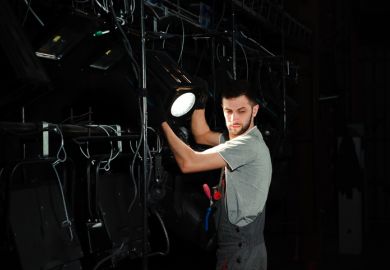Nearly a decade ago, England’s then education secretary, Nicky Morgan, warned that young people choosing to study arts subjects could be held back “for the rest of their lives”.
Speaking at the launch of a government campaign to promote STEM, she added: “If you didn’t know what you wanted to do…the arts and humanities were what you chose. Because they were useful – we were told – for all kinds of jobs. Of course, now we know that couldn’t be further from the truth.”
Ouch.
I was the University of Warwick’s pro vice-chancellor for research in the arts and social sciences at the time, and Morgan’s speech bluntly illustrated an uncomfortable challenge for people like me: to articulate the true value of humanities courses in the digital age. Dare I say it, but did she have a point?
There is no question that humanities have experienced a long-term relative decline in UK universities, accounting for just 8 per cent of degrees in 2019-20, compared with 28 per cent in 1961-62. And absolute numbers of humanities students have fallen by about 40,000 over the past decade. Hundreds of arts and humanities courses have disappeared as a result, particularly at post-92 universities.
Weak economic growth and the cost-of-living crisis have placed an even greater focus on value for money. In 2021, the government announced it was cutting funding for arts and creative courses in England by 50 per cent, explaining that it was “reprioritising” in order to “target taxpayers’ money towards subjects that support the NHS, science, technology and engineering, and the specific needs of the labour market”.
So in the age of AI, technology and the global race for STEM skills, do we need universities to get real and accept that the days of arts degrees are numbered?
The short answer is no. Indeed, at Warwick we’ve invested £100 million in arts and humanities over the past five years or so – more than at any time in our history.
We opened our award-winning new Faculty of Arts building 18 months ago, incorporating an antiquities room, cinema, media lab, theatre studios and multipurpose event and exhibition spaces. And last month I officially opened our beautiful new home in the heart of Venice. Overlooking the Grand Canal, the space within the Palazzo Giustinian Lolin will be the new location for our unique “Venice term”, which since 1967 has allowed our second-year students to study the Renaissance in situ – and to experience life in a different culture.
The reason why Warwick is backing the arts so heavily should not come as a surprise. The arts and creative industries are one of the UK’s great global success stories, contributing more than £100 billion a year to the economy. Worldwide, the UN estimates that the creative economy industries generate more than $2 trillion annually, accounting for nearly 50 million jobs.
About half those positions are occupied by women, and the creative industries employ more people between the ages of 15 and 29 than any other sector. These are the jobs of the present and future, not remnants of a dying industry. But we need to stop talking down the arts and humanities. The constant commentary, both within and outside the sector, about supposed crises has led to something of a vicious cycle.
It is a theme brilliantly illustrated by the Higher Education Policy Institute’s recent report, The Humanities in the UK Today: What’s Going On, which challenged the perception that the subjects were fighting for survival. Rather than simply looking at student enrolment, the authors point out that arts and humanities are the UK’s highest-performing disciplinary area in terms of citation data, contributing significantly to the high placing of many UK universities in global rankings.
At Warwick, student applications for arts and humanities are on the rise. We have seen an 11 per cent increase in undergraduate applications this year, including a 33 per cent increase in English and comparative literature subjects and 25 per cent in history compared with our 2022-23 admissions cycle.
And graduate employment prospects remain positive. For instance, 90 per cent of our English literature and creative writing students were in jobs or continuing their studies 15 months after graduating.
These positive signs should not be misinterpreted as an institutional version of sticking our fingers in our ears and ignoring the noise outside. Technology has changed so much, so quickly, so we must keep evolving and changing how and what we teach – whatever the subject.
The reality is that we need to invest in both STEM and the arts. It’s not one or the other – it’s both. Indeed, the future will see more integration of these disciplines along with a renewed focus on sharing of skills, knowledge and approaches from different subjects.
Warwick’s innovative global sustainable development undergraduate degree, for instance, flexibly marries science with humanities to explore how we can work and live in a way that safeguards environmental, social and economic well-being. And our new Venice home will also be used for business, science and international partnerships – not just arts subjects.
Following Nicky Morgan’s attack all those years ago, it didn’t take long for journalists to point out that only one out of the 22 cabinet ministers had a science degree. That may not be the ideal balance either, but if humanities degrees were – and still are – deemed suitable preparation for the highest offices in the land, it is hard to see why we would want to give up on them any time soon.
Stuart Croft is vice-chancellor of the University of Warwick.
Register to continue
Why register?
- Registration is free and only takes a moment
- Once registered, you can read 3 articles a month
- Sign up for our newsletter
Subscribe
Or subscribe for unlimited access to:
- Unlimited access to news, views, insights & reviews
- Digital editions
- Digital access to THE’s university and college rankings analysis
Already registered or a current subscriber?








